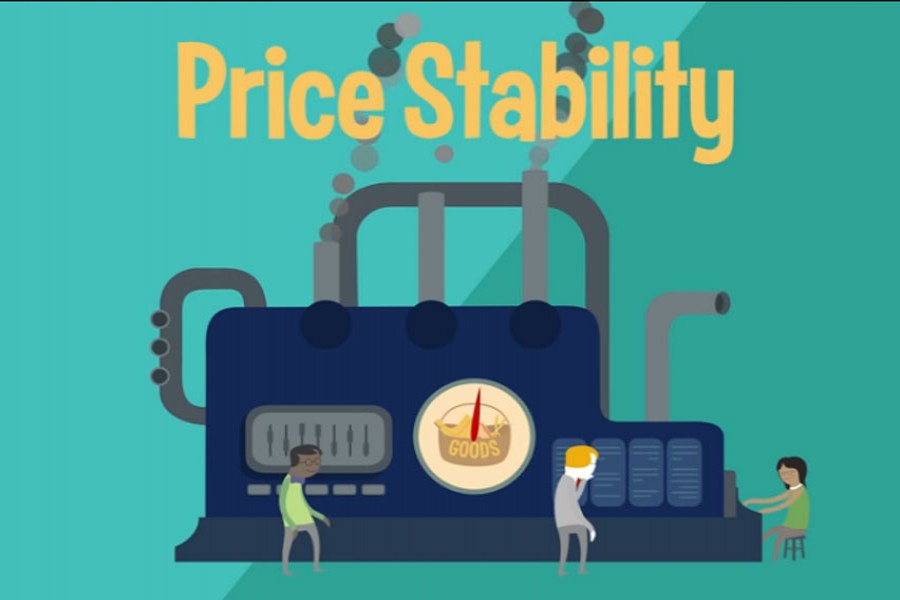The major central banks' vigilant pursuit of positive but low inflation has become a dangerous delusion. It is dangerous because the policies needed to achieve the objective could have unwanted side effects; and it is a delusion because there is currently no good reason to be pursuing the objective in the first place.
In the 1970s, when inflation in the advanced economies rose sharply, central banks rightly resisted it. The lesson central bankers took from that battle was that low inflation is a necessary condition for sustained growth. But, subtly and over time, this lesson has morphed into a belief that low inflation is also a sufficient condition for sustained growth.
That change may have been due to the benign economic conditions that accompanied the period of disinflation from the late 1980s to 2007, commonly referred to as the "Great Moderation." For central bankers, it was comforting to believe that they had reduced inflation by controlling demand, and that their policies had many beneficial side effects for the economy. After all, this was the demand-oriented narrative they had used to justify tight money to begin with.
But then the world changed. From the late 1980s onward, low inflation was largely due to positive supply-side shocks - such as the Baby Boomer-fuelled expansion of the labour force and the integration of many emerging countries into the global trading system. These forces boosted growth while lowering inflation. And monetary policy, far from restricting demand, was generally focused on preventing below-target inflation.
As we now know, that led to a period of easy monetary conditions, which, together with financial deregulation and technological developments, sowed the seeds of the 2007 financial crisis and the ensuing recession. The fundamental analytical error then - as it still is today - was a failure to distinguish between alternative sources of disinflation.
The end of the Great Moderation should have disabused policymakers of their belief that low inflation guarantees future economic stability. If anything, the opposite has been true. Having doubled down on their inflation targets, central banks have had to rely on an unprecedented array of untested policy instruments to achieve their goals.
For example, many central bankers are now recommending the use of "macroprudential" instruments to manage systemic risks in the economy - which, in turn, will allow them to keep interest rates "lower for longer." The problem with this approach is that there is little, if any, empirical evidence to suggest that such policies will work as intended.
Central bankers sometimes rationalise their current policies not by extolling the benefits of low inflation, but by underscoring the heavy costs of even mild deflation. Yet while there is ample evidence showing that high inflation is more costly than low inflation, it is hard to find similar evidence that mild deflation is all that costly.
In fact, the widely held assumption that consumers and corporate investors will extrapolate from past price declines and hold off on making purchases as a result of deflation has essentially no empirical support behind it. Recent consumer responses to sectoral price declines in various countries, not least Japan, all suggest the very opposite.
True, as a matter of arithmetic, deflation increases the real (inflation-adjusted) burden of debt service. But if debt levels are at onerous heights as a result of easy-money monetary policies, it is not obvious that the solution to the problem is still more easy money.
Central banks' fixation on positive but low inflation under today's prevailing economic conditions is also increasingly dangerous. Global debt ratios have risen sharply since the financial crisis began, while traditional lenders' margins have been squeezed, raising questions about their overall health. And as lending has continued to migrate further into the "shadows," price discovery in financial markets has become severely compromised, to the point that many assets now seem to be overvalued.
These developments constitute a threat not just to financial stability, but also to the workings of the real economy. Moreover, one could argue that easy money itself has contributed to the unexpectedly strong disinflationary forces seen in recent years. Owing to easy financing and regulatory forbearance, aggregate supply has risen as "zombie" companies have proliferated. Meanwhile, aggregate demand has been restrained by the debt headwinds - yet another result of easy monetary conditions.
In view of these conditions, continuing to insist on monetary easing seems particularly ill advised. With so many potential dangers on the horizon, central bankers should at least consider rethinking the fundamental assumptions underlying their policies.
So, what should policymakers do? In the immediate future, governments must stop relying so much on central bank policies to restore sustainable growth. Rather than obsessions over inflation targets, policymakers should (belatedly) start asking themselves what practical measures they can take to prevent another crisis from erupting. Equally important, they need to ensure that they have done everything they can to prepare for such a scenario, in case their preventive measures prove inadequate.
Looking even further into the future, when some semblance of "normality" has been restored, central banks should focus less on hitting near-term inflation targets, and more on avoiding "boom-bust" credit cycles. Unlike slight deviations from inflation targets, or even slight deflation, the latter actually are costly.
William White, a former deputy governor of the Bank of Canada, and a former head of the Monetary and Economic Department of the Bank for International Settlements, is Chairman of the Economic and Development Review Committee at the OECD.
Copyright: Project Syndicate, 2017.
www.project-syndicate.org.


